How to Safely Store Fruit to Keep It Fresh and Tasty

Wasting food never feels good, but it can be especially frustrating when you’ve just spent a fortune on it. This is often the case with produce, which tends to drive up the shopping bill and lose freshness fast. Since fruit is typically among the first things to spoil once you’ve brought your grocery haul home, it pays to learn how to lengthen its shelf life and avoid premature rotting. Ready to get started? Here’s how to keep fruit fresh and tasty for longer.
RELATED: 13 Worst Items to Store in Your Pantry.
1
Soak cut fruit in lemon juice.

Pre-cutting your fruit so that it’s ready to eat can help you make smart snacking decisions later, but by doing so, you also run the risk of it browning prematurely.
Shelley Balls, MDA, RDN, LDN, a registered dietitian and nutritionist for Consumer Health Digest, says that soaking your sliced fruits in lemon juice can help prevent them from turning brown because lemon juice contains citric acid, a natural antioxidant that slows over-ripening.
“Mix one tablespoon of lemon juice with one cup of water and soak the apple slices for three minutes. You can also use other juices with citric acid, such as orange, lime, and pineapple juice to help prevent browning,” she tells Best Life.
2
Move fruit to the front of the fridge.
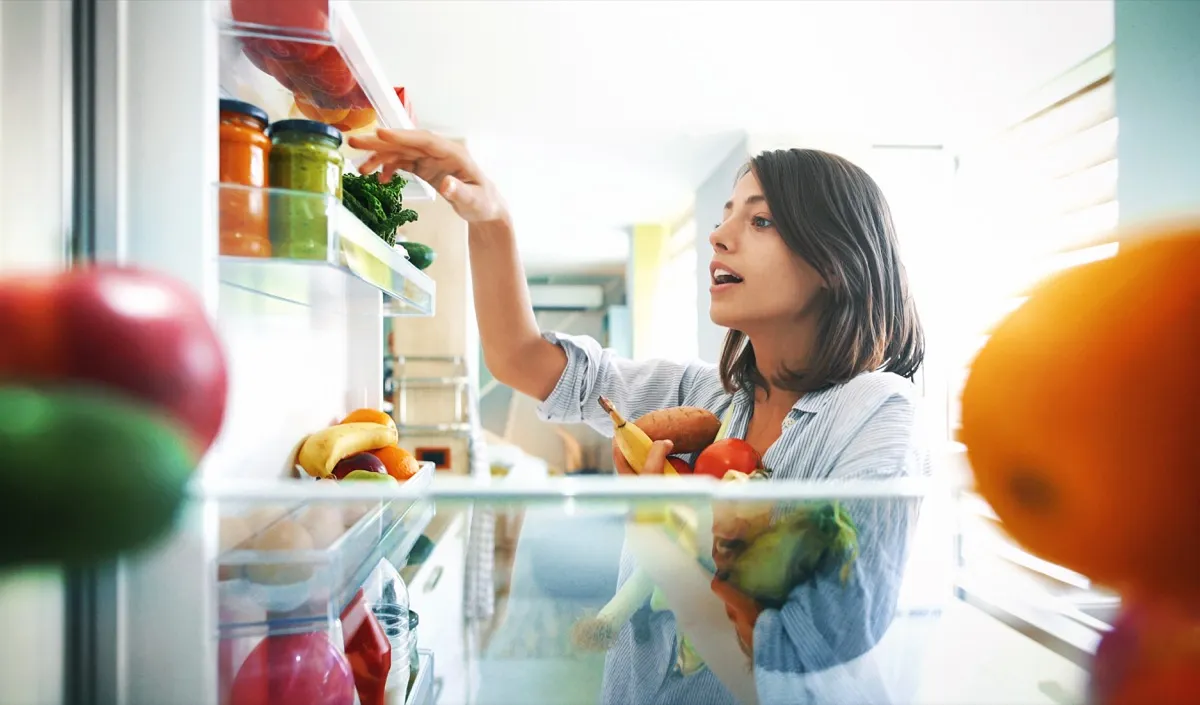
Usually, the best place to store fruit is in a low-humidity crisper drawer, but if you sense your fruit is nearly past its prime, Balls suggests moving it to the front of your fridge so you don’t forget about it.
“Sometimes we forget we have fruit in the fridge, especially if it’s stored behind other items or in a drawer out of sight,” she says. “If you have whole fruits such as oranges and bananas, place them in a bowl on your counter to nudge you to grab one when looking for a tasty snack. If you store bananas and oranges in the pantry, there is a higher chance they’ll be forgotten about.”
RELATED: 7 Things You Should Never Keep in Your Fridge, According to Experts.
3
Don’t wash your fruit long in advance.
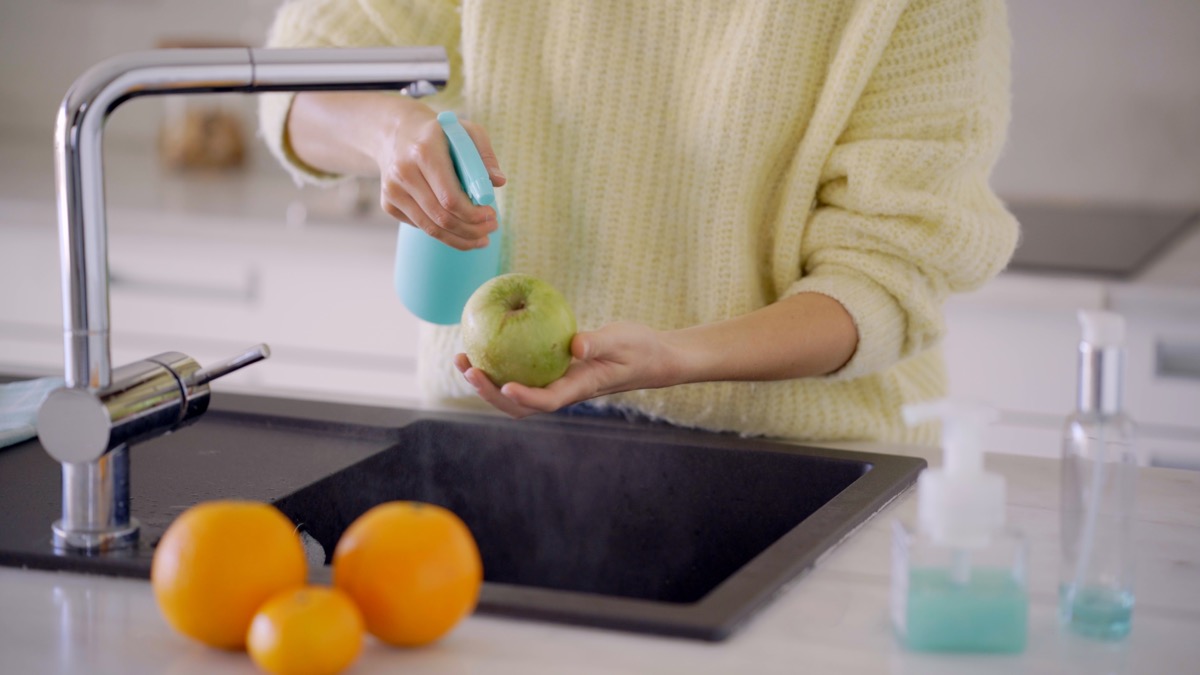
It’s always a good idea to thoroughly wash your produce to remove bacteria, pesticides, and other contaminants. However, experts suggest holding off on washing your produce until just before eating it to preserve freshness for longer.
“Sometimes it is tempting to wash berries right when you put them in the refrigerator when you get them home from the store. However, it is better to wait until you are going to eat them to wash them,” says Kimberley Wiemann, MS, RD, CDN, a registered dietitian and the founder of Kimberley Wiemann Nutrition. “Extra moisture that collects and remains on the berries can actually cause the berries to grow mold faster.”
4
Remove any moldy fruit.
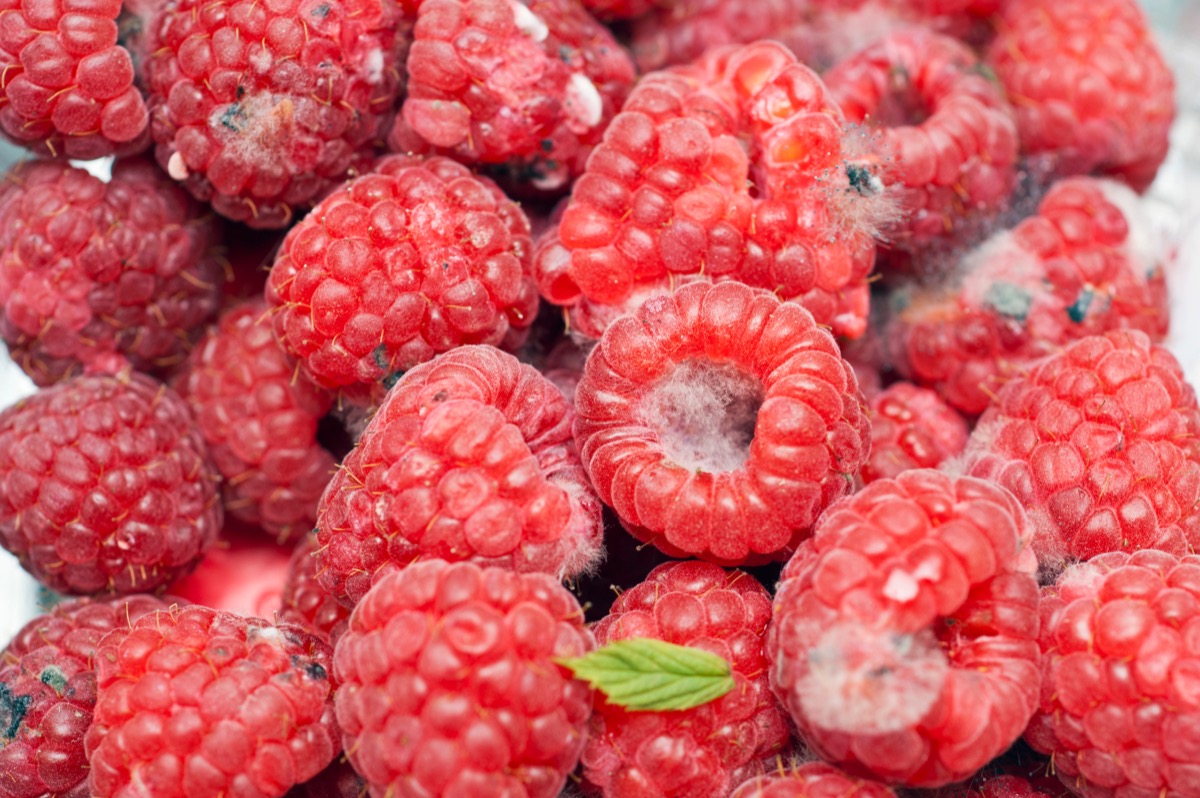
According to the United States Department of Agriculture (USDA), eating moldy fruit can cause allergic reactions and respiratory problems. That’s why you should always throw away moldy pieces of fruit, as well as any that are touching them.
“Take a close look at the remaining pieces of fruit: if there are no signs of mold and the fruit is not overly mushy, thoroughly wash the fruit prior to consuming,” the USDA writes.
By preventing mold spores from traveling from one piece of fruit to the next, you can prevent the whole bag or carton from spoiling.
“Store fruit such as berries in a single layer in a shallow, airtight container or glass jar with a lid,” Balls suggests. “I have found that airtight containers help prolong the amount of time fruit stays juicy and fresh.”
RELATED: 5 Things in Your Pantry You Need to Throw Out.
5
Add paper towels to your berry containers.
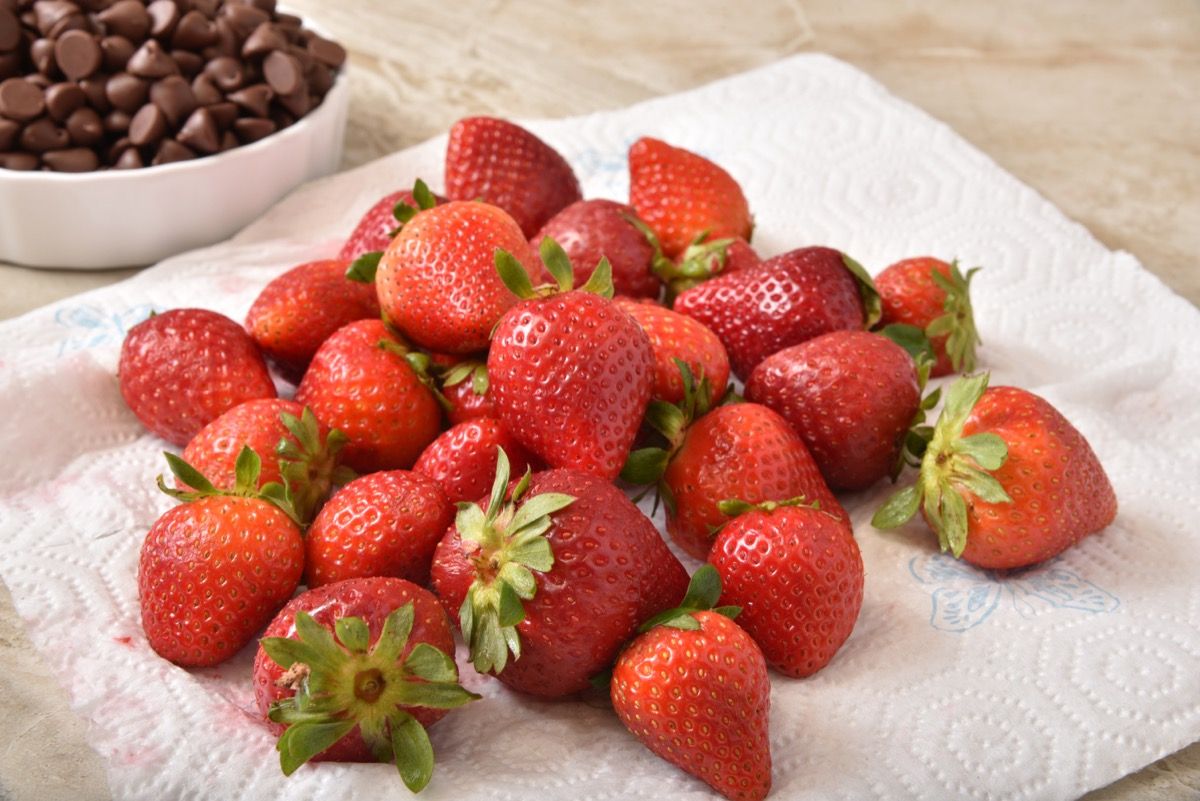
Lauren Twigge, RD, a registered dietitian, social media influencer, and owner of Lauren Twigge Nutrition, recently attended a berry farm tour, where she received a helpful tip for preserving berries and preventing spoilage.
“Place a dry paper towel on top of the berries in the plastic shell and then store the shell upside down in the refrigerator,” Twigge shares with Best Life. “This is a helpful storage tip because it causes the moisture to run down the berries and absorb into the paper towel, extending the life of your berries and keeping them fresher for longer.”
6
Separate your fruits strategically.
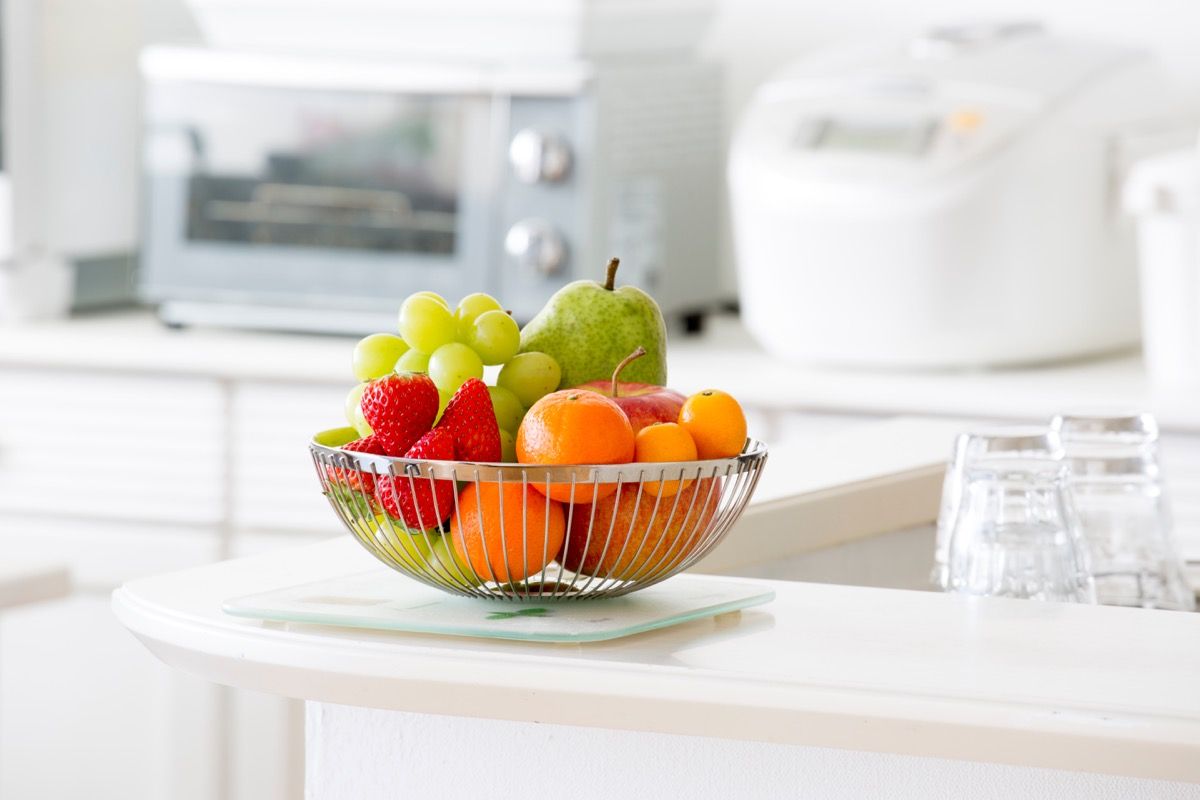
Some fruit will spoil prematurely when it’s kept near high-ethylene gas-emitting fruits. Bananas, cantaloupes, apples, peaches, and avocados are all good examples of fruits that release the gaseous ripening agent. By avoiding pairing ethylene-emitting fruits with ethylene-sensitive fruits, you can slow the ripening process, keeping your fruits fresher for longer.
You can check out a comprehensive list of what not to store together, courtesy of the UC San Diego Center for Community Health.
RELATED: 7 Foods You Should Never Freeze, According to Experts.
7
Know which fruits belong where.
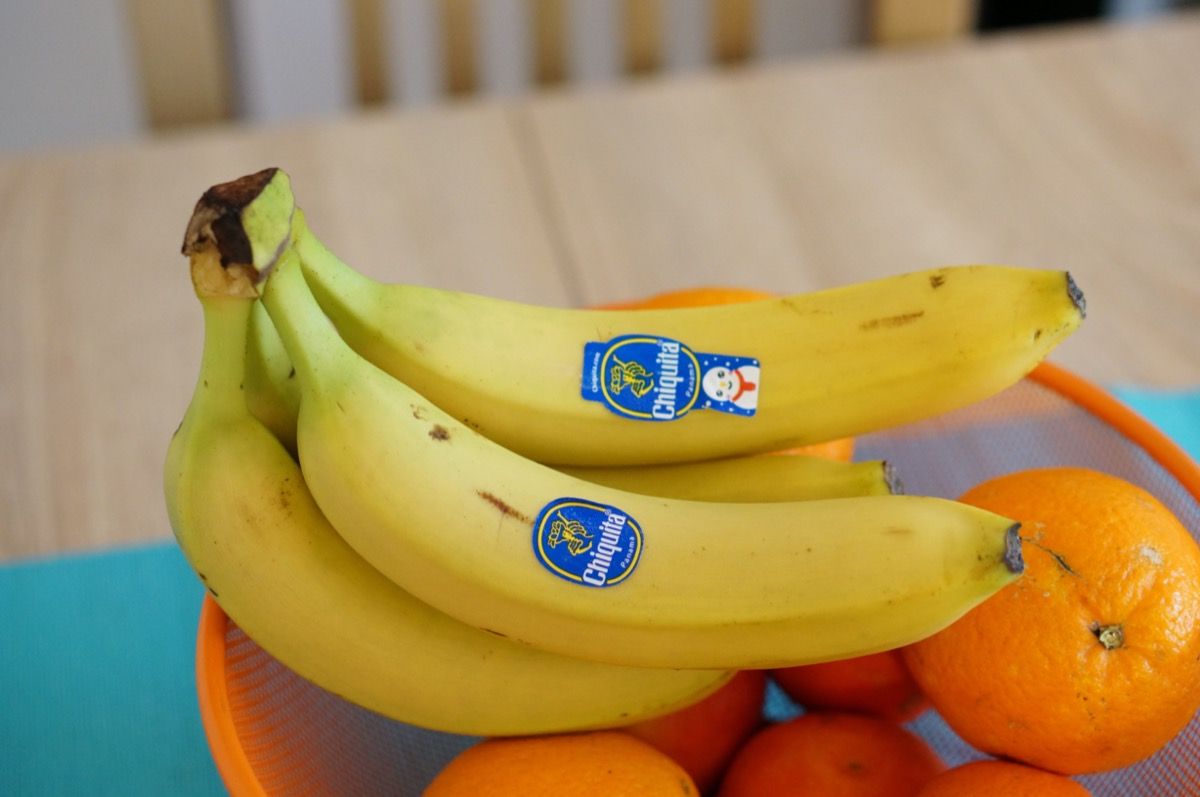
Remembering the needs of individual fruits will also help you preserve their freshness and flavor. Some fruits are best stored in the fridge, while others are best stored on the counter.
“For example, grapefruit, oranges, watermelon, lemons, and limes should all be stored at room temperature for the best taste,” says Balls. “If you have fruit that isn’t quite ripe, you can store it on the counter and then move it into the fridge once it’s at the desired stage of ripeness. You can do this with peaches, avocados, kiwis, mangoes, pears, and more.”
Wiemann adds bananas and cantaloupes to the list of fruits that should be refrigerated after a day or two on the counter. “This tip is actually surprising to most because when you put a banana in the refrigerator, the peel turns brown fairly quickly. However, the inside actually will remain perfectly intact and last longer than if it is left out on the counter,” she explains.
Similarly, it’s tempting to leave melons out on the countertop to wait until they’re perfectly ripe, but Wiemann says we often end up waiting too long: “Keeping the melon in the refrigerator uncut can help to slow the ripening process.”
8
Freeze your fruit.
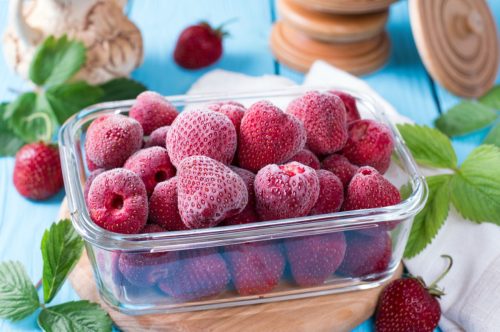
If you’ve simply bought too much fruit to eat before it spoils, consider freezing it to avoid food waste. Balls says mangoes, pineapple, and berries all freeze well.
“To do this, be sure to wash and dry the fruit first, slicing if appropriate, and freezing it in a single layer on a baking sheet lined with wax paper. Once completely frozen, transfer the fruit to an airtight container, vacuumed sealed bag, or re-sealable plastic bag,” she advises. “The quicker you can freeze the fruit, the better the texture will be once thawed, so don’t overcrowd your pan when freezing.”